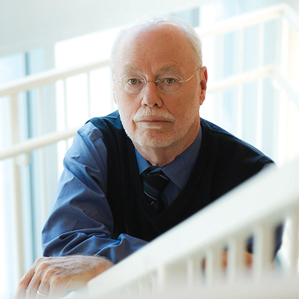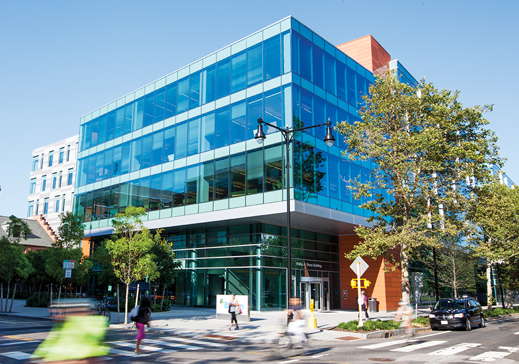The Man Who Helped Launch Biotech
Kendall Square may now be the center of the biotech industry, but Institute Professor Phil Sharp, HM ’96, remembers when the neighborhood was a virtual wasteland. Aside from the occasional vandal, “there wasn’t anyone there,” he says. An energetic 71-year-old with a trim white beard and wire-framed glasses, Sharp now works at the gleaming Koch Institute for Integrative Cancer Research, a stone’s throw from the site where the startup he cofounded kicked off the biotech revolution in Kendall Square.

In 1978, a year after pioneering research on split genes that would later earn him a Nobel Prize, Sharp and Harvard biochemist Wally Gilbert founded Biogen, a company using the new field of recombinant DNA to create treatments for diseases including multiple sclerosis and leukemia. “It was a technology we knew was going to impact the world, but it was all located inside universities,” remembers Sharp. “There was no practical application for molecular biology.” Though major pharmaceutical companies told him that “you won’t last a year,” the company persevered, opening first in Switzerland and then relocating to Cambridge, in a warehouse building on Binney Street. The biotech industry was born—and Kendall Square would never be the same.

Since then Biogen, now worth more than $90 billion, has become a leader in therapies for MS, hemophilia, and other genetic diseases. Though Sharp left its board in 2009, he has since cofounded Alnylam, which is based on RNA interference, a technology a Nobel Prize–winning former student created as a way to “silence” specific genes. (Alnylam, a $10 billion company, has its headquarters on Third Street.) Sharp remains active on the boards of the Whitehead Institute and the Broad Institute. And last year on Binney Street, on virtually the exact site of Biogen’s first home in Cambridge, the company opened the Phillip A. Sharp Building, whose shiny glass façade fits right in amidst a sea of gleaming buildings housing biotech companies.
Keep Reading
Most Popular
Large language models can do jaw-dropping things. But nobody knows exactly why.
And that's a problem. Figuring it out is one of the biggest scientific puzzles of our time and a crucial step towards controlling more powerful future models.
How scientists traced a mysterious covid case back to six toilets
When wastewater surveillance turns into a hunt for a single infected individual, the ethics get tricky.
The problem with plug-in hybrids? Their drivers.
Plug-in hybrids are often sold as a transition to EVs, but new data from Europe shows we’re still underestimating the emissions they produce.
Google DeepMind’s new generative model makes Super Mario–like games from scratch
Genie learns how to control games by watching hours and hours of video. It could help train next-gen robots too.
Stay connected
Get the latest updates from
MIT Technology Review
Discover special offers, top stories, upcoming events, and more.